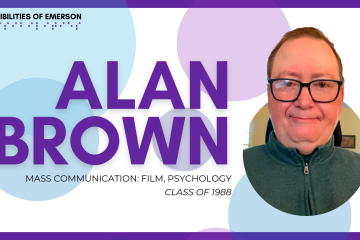Callisto Media is a relatively young publisher that’s experienced a lot of growth over the past few years. Situated between Silicon Valley and San Francisco, they’re a company focused on finding the meeting place between consumers and authors through tech-focused strategies. In short: They’re a company focused on challenging many of the precedents set by older and more established publishing houses in hopes of finding new and innovative ways to produce best sellers.
We recently caught up with Emerson alumnus and current Callisto employee Will Schrom ’07 to learn more about the company’s unconventional approach to publishing and how it compares to his prior experience at other publishing houses:


What was it that drew you to publishing to begin with?
“I have always been a passionate reader and writer. It’s always been something that I’ve prioritized in my life. I grew up in a very book-heavy household – like, my primary entertainment growing up was books. So the whole time I was growing up and as I was heading toward the end of high school I was heavily focused on honing my creative writing craft. But I also realized in high school that I was always interested in the community aspect to writing and connecting with other authors…
I always generally knew that I wanted to be in books. I’ve had a lot of different positions and responsibilities in publishing over the past decade but it’s all in service of the author and the reader — those are just kind of my people.”
How did you first start your career in publishing and what was the experience like?
“While I was studying at Emerson, I was also working for a literary agency based out of New York. I was working as a consultant using most of my spare time on Fridays and the weekend to focus on my work.
When I first started working for the literary agency as a Sophomore, part of the interview process for getting the job was having to edit a sample chapter of a non-fiction business book. I hadn’t done that in a job application context before but I had done plenty of that in a writing workshop context at Emerson and so I thought, when I was sitting there, ‘This is kind of like a homework assignment.’
So I ran through it, I red-lined it, and I ran through it like I would with any other editing assignment in class only this time in a more high-pressure environment. Then, when I finally got the job offer a week later, my hiring manager mentioned that I clearly had a lot more experience than most of the people they were interviewing for this entry-level position, particularly in the editing department.
That was the moment I realized that, it wasn’t any specific assignment or class, rather, it was my whole experience at Emerson that was really helping me put my best foot forward. It was something where I wasn’t even halfway through my college career yet, according to this professional publisher in New York, I was already well-adjusted for editing.”
What excites you about working at Callisto?
“Callisto is very interesting because it’s a very young company. It’s been around for 5-6 years now and it’s very uncommon to find a company that has grown as fast as Callisto has.
Callisto is also unique in that it’s founded from a tech background. We’re in Northern California, nestled between Silicon Valley and San Francisco, so the company is viewed with a sort of spirit which comes out of the tech sector. A lot of the workflows and ways of conceiving of the business’ growth and mission are very nontraditional when it comes to the publishing world.
And I find that very refreshing because, one of the things you realize with a traditional publishing house, is that there’s such a huge amount of precedent to work with. There’s a lot of set ways of doing things, things being organized, and books being brought to market. But with Callisto, with the Northern California way of thinking, you have to spend a lot of time questioning things asking why things are structured in a certain way.
That’s what I find very enticing about Callisto structurally. When I joined it was half-familiar, half-new.”
Do you have any advice for graduating Seniors?
Don’t compromise too early on what you want to do. Be as lofty and open in terms of what your long-term goals are as you can be. And don’t over-complicate it: Determine the kind of people you want to be around and then it’s a pretty simple answer as to where you want to be.
It’s so much easier to work when you’re passionate about the project you’re working on. Regardless of the creative project, just be sure that the core work is a source of enjoyment for you.


